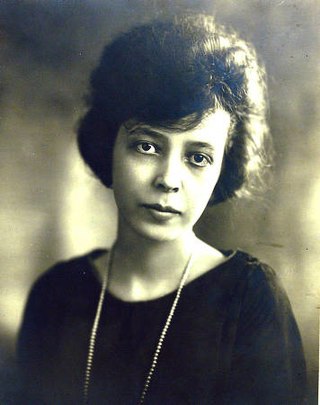Top Qs
Timeline
Chat
Perspective
Sara Haardt
American writer From Wikipedia, the free encyclopedia
Remove ads
Sara Powell Haardt (March 1, 1898 – May 31, 1935) was an American author and professor of English literature. Though she died at the age of 37 of meningitis, she produced a considerable body of work including newspaper reviews, articles, essays, the novel The Making of a Lady, several screenplays and over 50 short stories.[1] She is central to John Barton Wolgamot's notorious book-length poem, In Sara Mencken, Christ and Beethoven There Were Men and Women (1944), recorded by the composer Robert Ashley.[2]
Remove ads
Early life and education
Sara Powell Haardt was born on March 1, 1898, to Venetia (Hall) Haardt and John Anton Haardt in Montgomery, Alabama. She had German Americans ancestry on her father's side and was the eldest of five children. Haardt attended the Margaret Booth School. In 1920, she graduated Phi Beta Kappa from Goucher College in Baltimore, Maryland. While still an undergraduate at Goucher, she had become a professional writer, writing for literary reviews and popular periodicals.[citation needed]
Remove ads
Career
Haardt was immediately hired to teach at Goucher College in the English Department upon graduation.[1]
She became the head of the Alabama branch of the National Woman's Party, where she led the unsuccessful fight to have the Alabama legislature ratify the 19th Amendment.[3][4]
Haardt's childhood friend, Alabama author Sara Mayfield wrote extensively about Haardt's marriage to H. L. Mencken in her 1968 book The Constant Circle: H.L. Mencken and His Friends.[5] Despite Mencken's reputation for being "a rock-ribbed bachelor"[6] and his criticism of suffragettes,[7] they married in a small Episcopal ceremony in Baltimore on August 27, 1930.[8]
Remove ads
Death
Haardt died in 1935 from meningitis.[9] Her death was the result of complications of tuberculosis, from which she had suffered for many years.[10]
Recognition
Haardt's short story "Absolutely Perfect" won her a nomination for the O. Henry Prize in 1933.[1]
References
Sources
External links
Wikiwand - on
Seamless Wikipedia browsing. On steroids.
Remove ads

